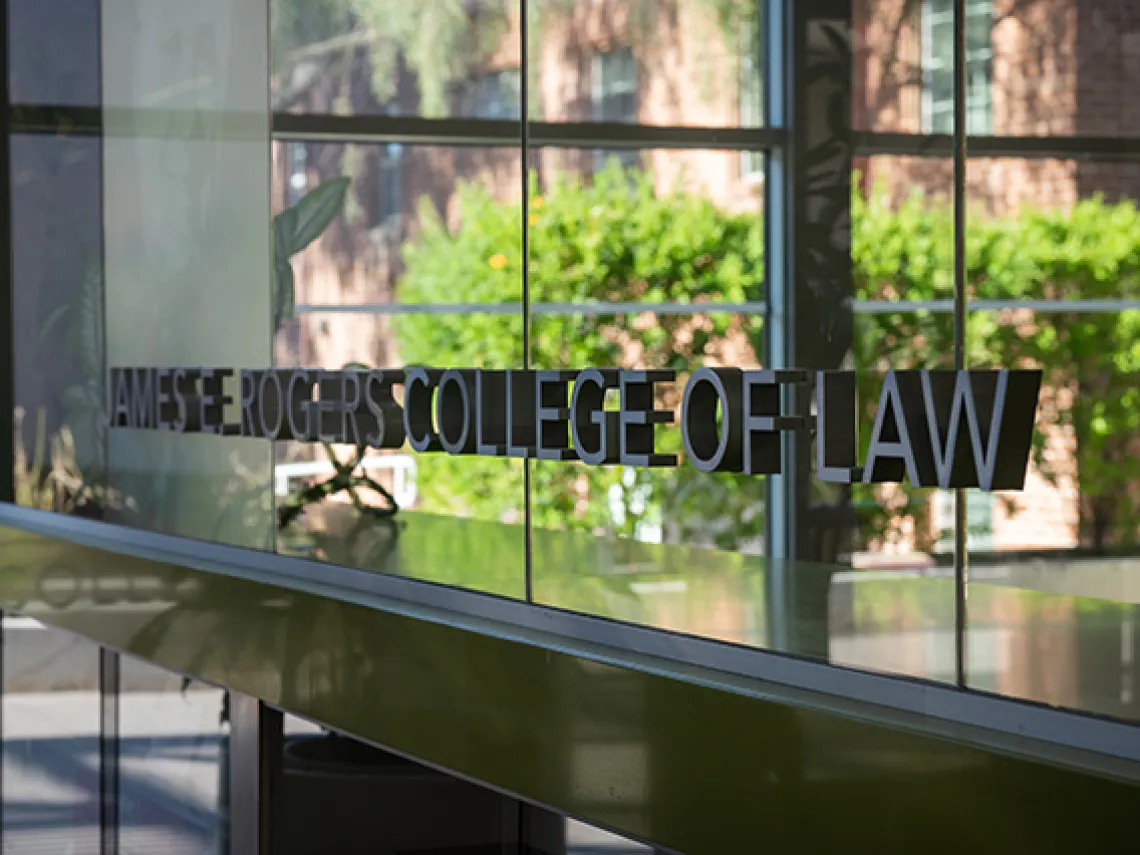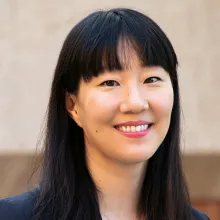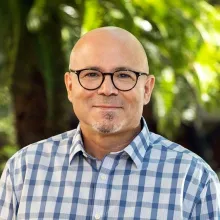University of Arizona Law 2024 Faculty Research Awards Recognize Diverse Range of Scholarship

The University of Arizona James E. Rogers College of Law has named the 2024 Faculty Research Award winners. The awards highlight the scholarly achievement of University of Arizona Law faculty. This year’s winners are:
Distinguished Legal Scholar Award: Andrew Coan
Distinguished Early Career Legal Scholar Award: Eunice Lee
Distinguished Public Service Scholar Award: Diana Newmark
Faculty Research Fellowship Award: Barak Orbach
Director of Empirical & Policy Research Christopher L. Griffin, Jr., served as this year’s Faculty Research Awards Committee Chair.
“The faculty colleagues recognized this year are truly distinguished in their contributions to legal scholarship and to the intellectual vibrancy of University of Arizona Law,” said Griffin. “The College is fortunate to have these four outstanding scholars among the faculty.”
Shalev Roisman, associate professor of law and Distinguished Early Career Scholar; Simone Sepe, Chester H. Smith Professor, and professor of law and finance; and Tara Sklar, faculty director of the Health Law & Policy Program, associate scholar, and Distinguished Public Service Scholar joined Griffin on this year’s Faculty Research Awards Committee, which reviewed materials and recommended this year’s award winners.
About the Faculty Research Award Recipients

Distinguished Legal Scholar Award
Andrew Coan is the associate dean for research, Milton O. Riepe Chair in Constitutional Law, and director of the William H. Rehnquist Center on the Constitutional Structures of Government. Coan’s current scholarship focuses on constitutional change, particularly through the lens of the Supreme Court’s decision in Dobbs v. Jackson Women’s Health Organization. He has written “What Is the Matter with Dobbs?,” which looks at the role of moral judgments that often underlie cases involving private decision; “Dobbs v. Brown,” which examines the analogies drawn by both sides in Dobbs to the landmark Brown v. Board of Education decision; and “Too Much, Too Quickly?,” which addresses the critique that the Supreme Court is changing too much, too quickly.
His recent work also explores the doctrine of “enumerationism,” which limits Congress’s powers to those specifically mentioned in the Constitution. This project includes articles on “The Original Meaning of Enumerated Powers” and “Interpreting Ratification,” both coauthored with University of Wisconsin Law School Professor David Schwartz. Coan and Schwartz are also working on a book under contract with Oxford University Press titled The Myth of Enumeration: Federal Power and the Failure of Originalism.
Finally, Coan is wrapping up a new article on artificial intelligence and constitutional interpretation called “The Interpretation Machine,” with University of Colorado Law School Professor Harry Surden.
“Andrew Coan is a prolific witness to the U.S. Supreme Court’s history and the broader significance of its present trajectory, especially since the recent Dobbs decision,” noted Griffin. “His recent publications critically examine originalist arguments and help us better understand this moment of great change at the Court.”

Distinguished Early Career Legal Scholar Award
Associate Professor of Law Eunice Lee’s research centers on migration, citizenship, and borders. As both a legal scholar and anthropologist, she also draws upon social theory and ethnography in her work.
According to Griffin, “Eunice Lee has written about timely immigration issues in her first four years at the College. She has brilliantly shed light on problems with the federal government’s detention and surveillance practices as well as constitutional deficiencies in border regulation.”
In the past year, Lee published an article titled “Immigration in the Shadow of Death,” which explores how immigration law places differing values on immigrant lives and normalizes death as part of the process. She also contributed a chapter in Feminist Judgements: Immigration Law Opinions Rewritten, published by Cambridge University Press.
In early summer 2024, Lee was also awarded a Capacity Building Grant from the University of Arizona Office of the Provost, Research Leadership Institute to support research on immigration law in the U.S. territories.

Distinguished Public Service Scholar Award
Diana Newmark is an associate clinical professor of law and director of the Education Advocacy Clinic. Her teaching and research interests include education law, juvenile law, and children’s rights.
In her recent article, “The Illusion of Due Process in School Discipline,” Newmark argues that due process is poorly defined and overly deferential to school officials in cases involving exclusionary student discipline (e.g., suspension and expulsion) that often have far-reaching consequences. Newmark’s scholarship draws from her experience directing the Education Advocacy Clinic, which represents Tucson-area children in school discipline proceedings and special education matters. “As we see in the Clinic, school disciplinary proceedings appear unfair to many students and their families,” said Newmark. “Because education is so important to every child, courts and legislatures should recognize more robust legal protections for students whose schools seek to exclude them.”
Under Newmark’s leadership, the Education Advocacy Clinic recently brought a successful petition to the Arizona Supreme Court for a rule permitting broader advocacy by non-lawyer advocates in education dispute resolution. This rule opened up opportunities for more representation at informal settings, i.e., outside of hearings, where disputes are often resolved.
“Diana Newmark’s work—in the clinical field, in news media, and in law review pages—grapples with vexing policy questions in our nation’s schools. Her visions for strengthening children’s due process rights and improving how schools approach discipline have impacted national conversations,” said Griffin.

Faculty Research Fellowship Award
Barak Orbach is the Robert H. Mundheim Professor of Law & Business and founding director of the Business Law Program. He is recognized globally as an expert in antitrust and corporate governance and periodically advises government agencies, companies, boards of directors, investors and trade associations.
“Barak Orbach is a global thought leader in antitrust law,” noted Griffin. “His deeply important work in the areas of competition and corporate governance is necessary reading as national governments reckon with artificial intelligence and scrutinize big tech practices.”
Orbach has written prolifically in recent years on antitrust and competition policy for the current technological age. This work includes a series of short papers on topics including “anti-bigness” sentiments by both progressives and conservatives suspicious of large businesses and institutions, as well as populist public policies and the strikingly different goals among bipartisan coalitions of would-be antitrust reformers. Other topics include greedflation; shrinkflation and AI-powered cartels, in which AI-based revenue management systems may decrease competition. These papers reached large global audiences of enforcement agencies, lawyers, economists, scholars and specialized reporters.
